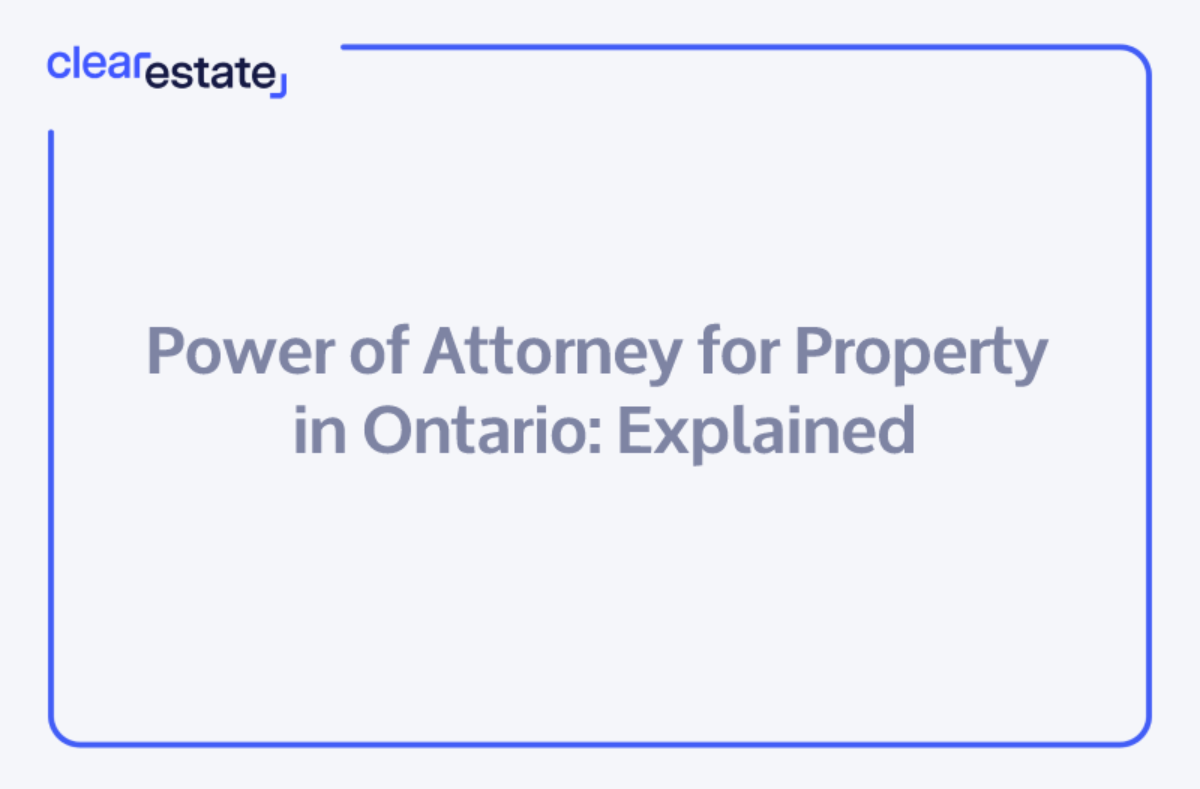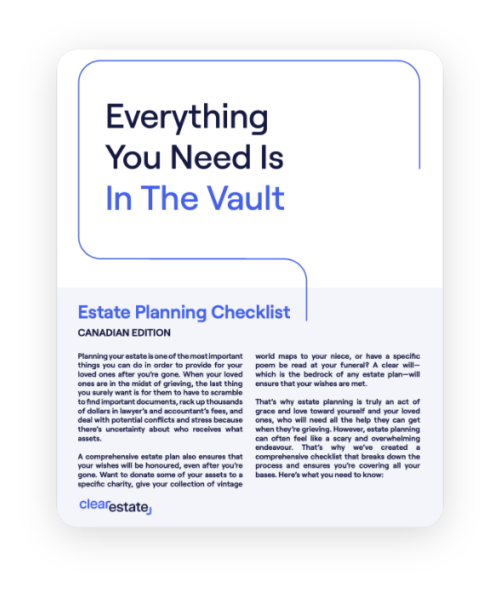Estate Planning
Oct 27, 2025
Introducing Empathy to Estate Bureaucracy
ClearEstate’s origin story: how grief, inefficiency, and compassion inspired Alex to build a fintech that brings empathy and efficiency to estate planning and settlement
Understand the aspects of Power of Attorney for Property in Ontario. Learn when it's necessary, how to establish it, their responsibilities and more.


Article Contents
Have you ever considered that life can throw you a curveball, and you are unable to make crucial decisions regarding your property or important financial matters?
Like most people, you may prefer being in control of your investments. Unfortunately, a time may come when you will be forced to let someone else make decisions on your behalf.
However, you can have control over who can make the property-related decisions. That is where the Power of Attorney for Property (POAP) comes in.
A POAP is a legally binding document that hands someone the authority to make financial decisions on your behalf and represent you when you are unavailable. Other reasons you should consider having a POAP are:
To safeguard your property investments, this comprehensive guide will explain when you need a POA for property, who can hold the power of attorney, their role and responsibilities, and how to revoke or modify a POAP.
A Power of Attorney for Property, a key part of estate planning, accords authority to a person you name as the grantor to make decisions on your behalf or manage your financial affairs. The person given the responsibility is called an attorney or agent. They are required by Ontario law to act in your best interest.
A POA for property deals with the purchase, sale, and management of your financial property and assets. The following are the powers you can give an attorney in Ontario:
Granting extensive powers to another person carries a risk you can prevent by choosing someone responsible and trustworthy. They must act in good faith and within the powers granted.
A Power of Attorney is a term that includes other legal documents that authorize someone else with various powers. However, key distinctions exist that separate one from the other. The following table highlights these differences.
POA for Property |
Limited/Special POA |
Continuing POA |
Enduring/Springing POA |
|
Duration |
Revoked by the grantor or upon your death |
Limited duration or handles specific matters as defined in the document |
Continues until you revoke it or particular conditions are met |
Stays effective even when you become mentally incompetent |
Scope |
Property-related and financial matters |
Specific tasks or decisions as defined in the document |
Specified tasks or decisions that continue over time |
Personal and property-related matters |
Purpose |
Manage property-related and financial matters. |
Execute specific tasks or make decisions for a limited period or on specific matters. |
Provide ongoing authority for specified tasks or decisions. |
Handles both personal care and property decisions |
Activation |
Upon signing |
Upon signing and for the defined period or specific issues |
Upon signing and continues until specified conditions are met |
Upon signing and continues after you lose decision-making capabilities |
A POA for property, a crucial legal document in estate planning, becomes necessary when you are incapacitated due to a disability, accident, or illness.
In such a state, you may be unable to manage your financial matters or make decisions. A POA for property enables a trusted person to step in and ensure your financial and property-related matters continue without disruptions.
Another situation you may need to have a POAP could be when you plan to travel outside Ontario and you'll be absent for an extended period. A POAP allows your attorney to sign documents, manage investments, and handle any arising issues.
A POAP also helps you plan for a time you may experience cognitive decline or suffer from dementia or Alzheimer's. These conditions prevent you from making well-calculated decisions. A POA for property ensures your financial interest remains protected and managed properly.
Indeed, a POAP helps you enjoy peace of mind knowing your property is in the hands of a responsible and skillful person. It also enables you to avoid financial mismanagement, delayed decision-making, and unnecessary disruptions.
Ontario provides specific requirements that a person, often a trusted family member or legal professional, must meet to qualify as an attorney.
This individual must:
In some situations, you may opt to appoint more than one person to act as an attorney. In Ontario, you can grant them authority to act independently (several authority) or together (joint authority).
Establishing a POA for property, a key step in estate planning, is a straightforward process, but you must first meet these requirements:
Once you meet these requirements, follow the steps below to establish a valid POA for property in Ontario:
Some common pitfalls you should avoid include choosing the wrong person (not considering their abilities), failing to seek guidance, giving unclear instructions to the attorney, and failure to involve important people in your life.
The attorney for property can be a stressful role if handled by a person not informed beforehand of the various duties involved. The following are the roles and responsibilities of the attorney for property:
Ensuring the attorney you choose understands these roles will reduce their chances of becoming overwhelmed after taking the role and asking to be released.
Sometimes, people avoid making POAs because they feel they are relinquishing their powers and may lose control of their property. However, with the right guidance and procedures, you can change or cancel your POAP if necessary.
Ontario allows you to revoke or modify the POA for property as long as you meet these conditions:
In Ontario, the legal requirement states that the revocation or modification should be done in writing and signed. You must state you are revoking the POAP. The document should be delivered directly to the attorney granted the powers.
Follow these steps once you decide to revoke the current POA for property:
Making your Power of Attorney for property can be a complex task. It guarantees your financial and property affairs are well managed in your absence or due to unavoidable circumstances.
However, ensuring you follow Ontario laws and the legal formalities can cause you to feel overwhelmed.
Seek a true professional who will ensure you meet all of the requirements and address your unique considerations as you make your POA for property. Contact ClearEstate today for a free consultation.
 Secure Your Legacy
Secure Your Legacy
Get your free 12-step Estate Planning checklist now. 89% of readers complete their estate plan within 3 months of using our guide.
Instantly Access Now